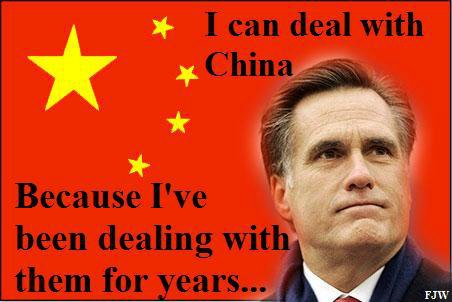Bain and switch
No wonder the Romney campaign and helpers have been going on about ‘China’. Bain Capital, Romney’s company, has taken over an Illinois auto-parts company named Sensata Technologies and is closing it down–and shipping the jobs to China. People working at the Freeport, Ill., plant have the unenviable final task of training their Chinese replacements.

Sensata Technologies
A sympathetic Steelworkers Union video about the plant closing appears here. Some Sensata employees have set up a mini-camp they name ‘Bainport’, to draw attention to the move. Some of them have also participated in a Bain Workers Bus Tour.

Bainport encampment
No word yet on whether Toyota will number among customers for the sensors and thermal circuit breakers manufactured by Sensata Technologies in Asia.
In hindsight, Romney’s bringing up China at all pinpoints his own ties to China. Of course Mitt Romney would castigate the Obama administration about China. Bain Capital wanted and tried to enter into a $3 billion technology deal with a Chinese company, and the deal fell through only after national security-conscious regulators called a halt. Of course pro-Romney television ads would use ‘China’ as a talking point. A glance at the giant database LexisNexis turns up more than 3,000 hits for ‘China’ [ + ] with ‘Bain Capital’. Admittedly there are other political angles played in Romney’s flogging ‘China’. Former President George H. W. Bush went to China as ambassador. Former GOP candidate Jon Huntsman, more dignified and more plausible as a candidate than Romney himself, served as U.S. ambassador to China. Both Bush and Huntsman fall into the ‘no help’ or ‘little help’ columns, for Romney. U.S. trade with China benefits some of Romney’s business rivals as it benefits him. Still, it has always mystified me that Romney would even bring up ‘jobs’, especially in connection with ‘China’, since no sane person can claim that Romney himself has made a career of protecting other people’s jobs, of broadening the employment base, of opposing mergers and acquisitions that shrink manufacturing largely while expanding certain tiers of management slightly. The whole China talking point illustrates the Karl Rove tactic of attacking the other guy where you’re weakest yourself, the cheesy tactic of pre-emptive strike.

Cartoon
Incidentally, when Romney himself appeared in China, he did what his crew would call ‘apologizing for America’: Romney told Beijing university students, quote, that “America makes mistakes.” Yes, Romney the GOP nominee for the White House went to China and, in typically self-deprecating fashion, shared with students at Tsinghua University that his country, the U.S.A., “makes mistakes.” Had the candidate released his tax returns for 2006 and 2007, evidence for the trip would appear as speaker fees, under the category of earned income. The speaker appearance was only scantly reported.

Romney speaking engagement, Beijing
Selling one thing and then delivering another is called bait-and-switch, in business. In politics, it’s called flip-flopping–a soft accusation that lets the fraudulent off the hook.
In the 2012 election, we’ve got one candidate who killed Osama bin Laden and saved the U.S. auto industry, and another candidate whose company provably ships jobs abroad, and wrote an opinion piece titled “Let Detroit Go Bankrupt”–and polls show the race as close?

The Detroit headline
Obama is still ahead, as he has mostly been, pre-election–a point conspicuously not made in reporting by the national political press.
Tonight’s town-hall format debate on CNN may help, although Candy Crowley may be bent on asking President Obama the questions no one could answer, and asking Mitt Romney the questions anyone could answer. One of Crowley’s specialties is false equivalencies between ‘left’ and ‘right’. Her notion of originality probably goes to accusing Romney of being too polite. Up-ending expectations; a reversal of sorts. With luck, she will not pull that old stunt of challenging Obama to reveal national security secrets or crucial strategy–classified information–and then suggesting soft-on-terrorists when he doesn’t. That one has long been a favorite with the If-it-quacks-like-a-duck crowd.
Questions put by ‘undecided’ voters, i.e. by people waiting to vote with the majority, inherently give the advantage to Romney–who is, as Joy Reid said, basically a salesman. In the freedom of privacy, one can ignore or brush off a sales rep. It will be illuminating to see how Romney enters, how he attempts to convey I’m-the-winner-go-with-me. It would be nice to hear Romney answer questions about his campaign-trail blood-and-thunder rhetoric on foreign policy. Then there’s that matter of paying for embassy security when you’re talking about cutting the deficit. The giant LexisNexis database turns up no mentions of ’embassy security’ with Romney’s name before September 2012, by the way.
On a more superficial debate detail–it will be interesting to see whether Romney looks tan as he did in the Republican primary debates back through 2011-2012, or pale as he looked in the first presidential debate with Obama. Change of makeup? Deliberate choice, for contrast? Mere fatigue?

Romney fan t-shirt
Surely CNN cameras will not find t-shirts in the audience saying “Put the white back in the White House.” It’s unlikely that Crowley will quiz Romney on why he doesn’t quell the race-baiting in his party, though. It would be more like her to accuse the president of playing the race card by being African-American–an attitude typical of people who talk about ‘blame’ in regard to the U.S. economy.
Calling it ‘blame’ is obfuscation. The U.S. cannot afford to bury history any more than we can afford to suppress votes. We need to end the policies and practices that brought us to the brink of a second Great Depression. We need to prevent their continuance. We need to develop the financial literacy to see through false slogans about the deficit, etc. It is essential to remind the public that a Republican congress and a highly-funded movement of lobbyists across the country have opposed every positive step taken by the Obama-Biden administration. Calling the reminder ‘blame’ is bogus. Will Romney claim that he as president would have prosecuted the creators of the mortgage-derivatives crisis? He cannot claim that he would have prohibited the credit default swaps. Bain Capital even securitized franchise fees for Dunkin’ Donuts franchisers–speaking of arcane financial products.





